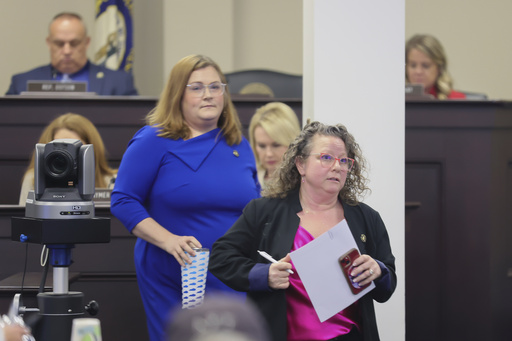FRANKFORT, Ky. (AP) — Democratic lawmakers walked out of a Kentucky committee hearing Thursday when the GOP-led panel took up a bill to expand access to prebirth and newborn services for pregnant women carrying nonviable fetuses that are expected to die before or soon after birth, in a state that bans abortion in such cases.
The three Democrats didn’t return to the committee room until after Republicans on the House Health Services Committee approved the bill dealing with perinatal palliative care.
“This is not about comforting bereaved parents, as it should be,” Democratic state Rep. Lindsey Burke said afterward. “It’s about making a political statement, and they’re not going to do that on my back.”
Supporters of the bill said it would increase access to compassionate, comprehensive care and support services for families dealing with the devastation of a life-limiting diagnosis for their unborn child. When an infant is expected to live only a short time after birth, it gives parents precious moments to spend time with the child, said Addia Wuchner, executive director of Kentucky Right to Life.
“No matter how extreme an anomaly can be, sometimes just to say hello by holding your child means everything,” she said. “And families should have that opportunity to make those choices.”
“You can’t say goodbye until you’ve said hello,” she added.
Wuchner, a former state lawmaker and prominent abortion opponent, sat next to the bill’s sponsor as the two presented the legislation to the House panel.
Abortion-rights supporters said afterward that the bill’s intent is to present just one option to parents with a nonviable pregnancy: to carry it to term. They said palliative care should include the option of abortion, which can only be obtained in other states that allow the procedure for nonviable fetuses.
“This is coercive,” said Tamarra Wieder, the Kentucky state director for Planned Parenthood Alliance Advocates. “It’s stigmatizing. And it’s at a time when parents are most vulnerable.”
Opponents see the bill as an attempt to grant personhood status to the unborn in Kentucky, a state that has banned all abortions except to save the woman’s life or to prevent a disabling injury.
The debate comes against the backdrop of a recent Alabama Supreme Court ruling that frozen embryos are legally protected children, which spotlighted the anti-abortion movement’s longstanding goal of giving embryos and fetuses legal and constitutional protections on par with those of the people carrying them.
After clearing the committee, the Kentucky bill heads to the full House next and would still need Senate approval. Republicans have supermajorities in both chambers.
The bill would require hospitals offering obstetric services to either provide perinatal palliative care programs and support services or refer patients to existing palliative programs. It also would apply to alternative birthing centers and would require health benefit plans to cover palliative care.
Palliative services would include coordinated care from a team including medical professionals, specific information about the medical diagnosis, and guidance and support before, during and after birth.
“I think this is a very compassionate piece of legislation,” said Republican state Rep. Nancy Tate, the bill’s lead sponsor and a staunch abortion opponent. “It gives us the opportunity to support women and their families –- physically, mentally, spiritually, emotionally and financially.”
Two health care systems in the state now provide such palliative care, supporters said.
Opponents said that while carrying nonviable pregnancies to term may be the option some choose, it’s not best for others.
“This bill simply provides the same solutions that are already available, while shaming parents who make difficult decisions,” Burke said.
When the three Democratic lawmakers stood up and quietly walked out as the committee prepared to review the measure, it appeared to catch their Republican colleagues by surprise.
“We were simply talking about providing supports for families who have a really devastating diagnosis that they’re dealing with,” Republican state Rep. Kimberly Poore Moser, the committee chair, said afterward. “And this is really just a way to provide support to them. So I was a little confused about why they would walk out.”
___
The legislation is House Bill 467.
Source: post





